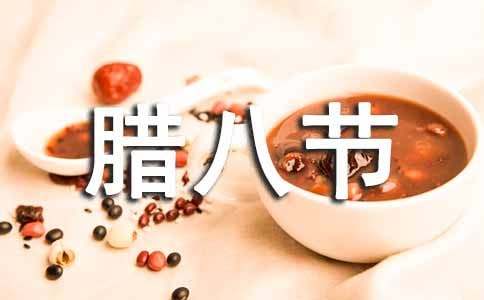關(guān)于臘八節(jié)的英語作文范文
臘八節(jié),俗稱“臘八” ,即是農(nóng)歷十二月初八,古人有祭祀祖先和神靈、祈求豐收吉祥的傳統(tǒng),一些地區(qū)有喝臘八粥的習(xí)俗。相傳這一天還是佛祖釋迦牟尼成道之日,稱為“法寶節(jié)”,是佛教盛大的節(jié)日之一。下面是關(guān)于臘八節(jié)的英語作文范文的內(nèi)容,歡迎閱讀!

臘八節(jié)的英語作文
The majority Han Chinese have long followed the tradition of eating laba rice porridge on the eighth day of the twelfth lunar month. The date usually falls in min-January and is a traditional Chinese festival.
Legend about the origin of this festivity abounds One maintains that over 3,000 years ago sacrificial rites were held in the twelfth lunar month when people offered up their prey to the gods of heaven and earth. The Chinese characters for the hunt and the twelfth month (lie and la) were interchangeable then, and ever since la has been used to refer to both. Since the festival was held on the eighth day of the last month, people later appended the number eighth (ba in Chinese), giving us the current laba.
譯文
大多數(shù)漢族人長期以來都遵循在農(nóng)歷十二月初八吃臘八粥的傳統(tǒng)。這一天通常在1月底,是中國的傳統(tǒng)節(jié)日。
關(guān)于這個節(jié)日的起源有很多種說法。有一種說法是大約3000年前,一種祭祀儀式叫做“臘”,會在農(nóng)歷十二月舉行。人們向天上和地下的神獻(xiàn)出他們的獵物。那時候,表示獵物的漢字“獵”和表示農(nóng)歷十二月的“臘”是可以通用的。從那時候起,“臘”就用來指這兩種意思了。因為這個節(jié)日是在最后一個月的第八天舉行的,后來人們就加上了“八”,于是就有了現(xiàn)在的臘八。
臘八節(jié)的英語作文
The Laba Festival, the day in most parts of China have the custom of eating Laba porridge. Laba is a harvest year with eight fresh food and fruits boiled, usually for the sweet porridge. The Central Plains have many farmers prefer salty to eat Laba porridge, porridge in addition to rice, millet, mung bean, cowpea, peanut, jujube and other raw materials, but also add pork, radish, cabbage, vermicelli, seaweed, tofu and so on.
臘八節(jié)這天我國大多數(shù)地區(qū)都有吃臘八粥的習(xí)俗。臘八粥是用八種當(dāng)年收獲的新鮮糧食和瓜果煮成,一般都為甜味粥。而中原地區(qū)的許多農(nóng)家卻喜歡吃臘八咸粥,粥內(nèi)除大米、小米、綠豆、豇豆、花生、大棗等原料外,還要加肉絲、蘿卜、白菜、粉條、海帶、豆腐等。
Laba Festival, the original ancient harvest celebrations, thanks to ancestors and gods (including the goalkeeper, household God, house of God, Kitchen God, well God) rituals, in addition to worship ancestors the activities, but also by people infected. This activity comes from the ancient Nuo (avoid the outbreak of the ancient ceremony of exorcism.) One way to prehistoric times, the exorcism of medical treatment illness. The activities of the twelfth lunar month as the witchcraft epidemic of custom drum drive, this and other areas in Hunan is still retained Xinhua. Later evolved into a commemoration of the Buddha Sakyamuni Road religious holiday. Xia said the December date, "Ka-ping," Shang was "clear Si", Zhou as "big wax"; due to be held in December, it said the month is the twelfth lunar month, known as La La at the festival that day. Pre wax at the third after the winter solstice Xu day fixed in the twelfth lunar month before the Northern and Southern started eighth day.
臘八節(jié)原自古代歡慶豐收、感謝祖先和神靈(包括門神、戶神、宅神、灶神、井神)的祭祀儀式,除祭祖敬神的活動外,人們還要逐疫。這項活動來源于古代的'儺(古代驅(qū)鬼避疫的儀式)。史前時代的醫(yī)療方法之一即驅(qū)鬼治疾。作為巫術(shù)活動的臘月?lián)艄尿?qū)疫之俗,今在湖南新化等地區(qū)仍有留存。后演化成紀(jì)念佛祖釋伽牟尼成道的宗教節(jié)日。夏代稱臘日為“嘉平”,商代為“清祀”,周代為“大蠟”;因在十二月舉行,故稱該月為臘月,稱臘祭這一天為臘日。先秦的臘日在冬至后的第三個戌日,南北朝開始才固定在臘月初八。
"Said the text" contains: "Shu at December after the winter solstice festival three hundred gods." Visible, Shu third day after the winter solstice was December day. Buddhism after the intervention of the Prince at eighth day in December changed since then Xiangyan into the vulgar.
《說文》載:“冬至后三戍日臘祭百神。”可見,冬至后第三個戍日曾是臘日。后由于佛教介入,臘日改在十二月初八,自此相沿成俗。
臘八節(jié)的英語作文
Laba is celebrated on the eighth day of the last lunar month, referring to the traditional start of celebrations for the Chinese New Year. La in Chinese means the 12th lunar month and ba means eight.
Legends about the origin of this festivity abound. One holds that over 3,000 years ago sacrificial rites called La were held in the twelfth lunar month when people offered their preys to the gods of heaven and earth. The Chinese characters for prey and the twelfth month were interchangeable then, and ever since La has been used to refer to both.
Since the festival was held on the eighth day of the Last month, people later appended the number eight (ba in Chinese), giving us the current Laba .
The majority Han Chinese have long followed the tradition of eating Laba rice porridge on the Laba Festival. The date usually falls in mid-January.
【臘八節(jié)的英語作文】相關(guān)文章:
臘八節(jié)英語作文12-03
關(guān)于臘八節(jié)的英語作文:難忘的臘八節(jié)01-17
臘八節(jié)英語作文及翻譯01-12
臘八節(jié)英語作文范文01-10
臘八節(jié)滿分英語作文02-05
臘八節(jié)的來歷英語作文12-01
有關(guān)臘八節(jié)英語作文12-13
臘八節(jié)的起源英語作文07-26